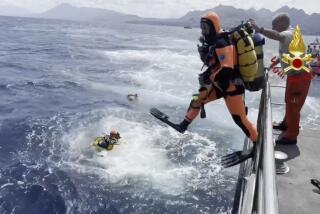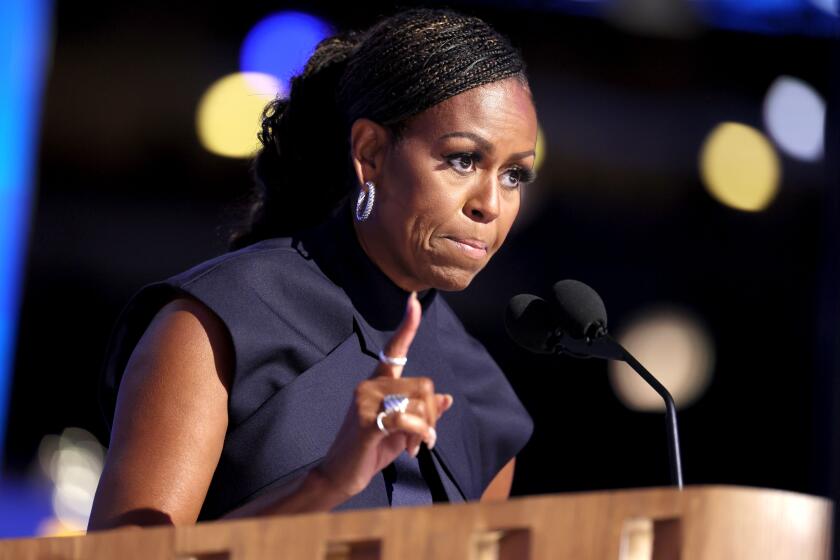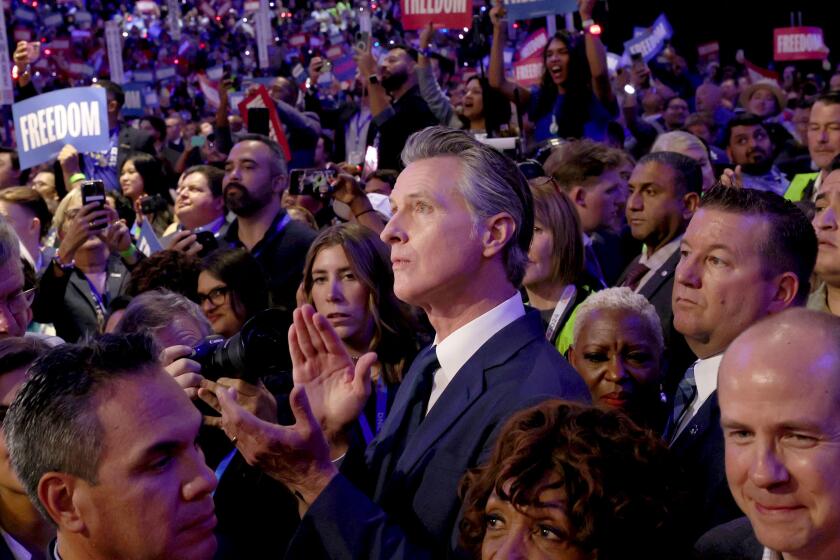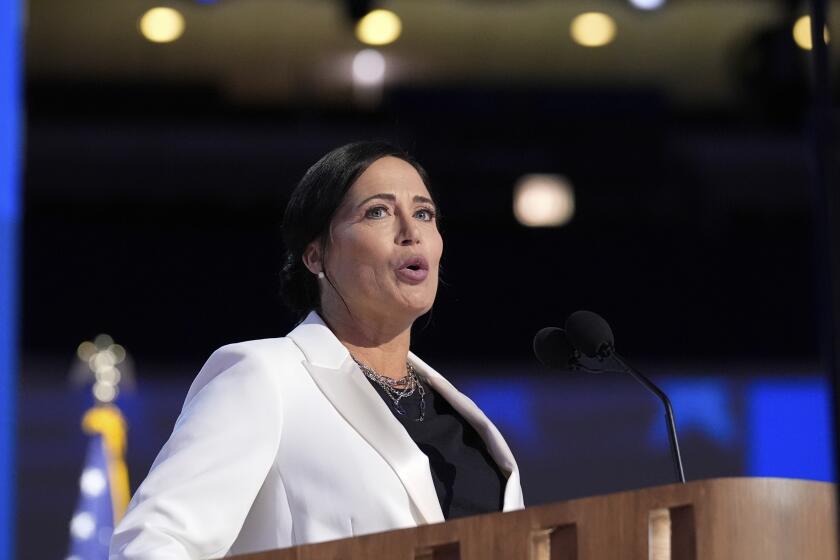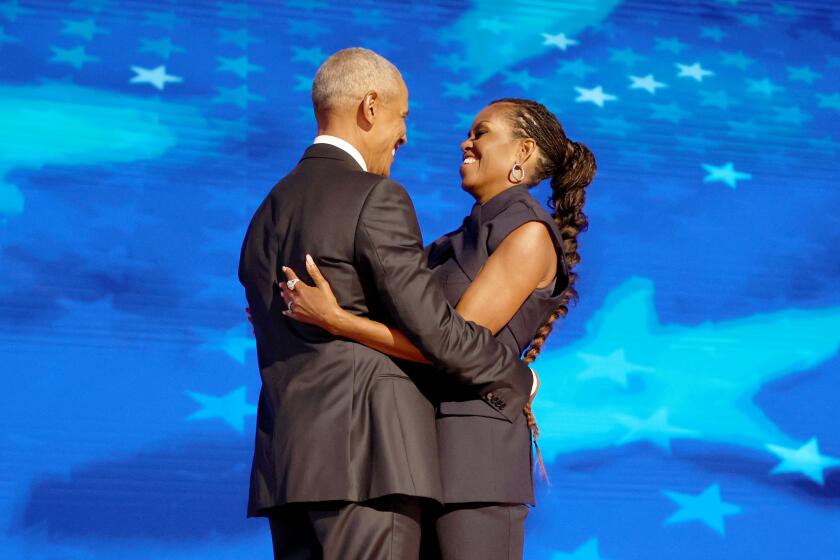Clinton Helps Bosnians Mourn Their Men
Draped in green cloth, 107 coffins were passed Saturday by outstretched arms over the heads of families mourning an 8-year-old slaughter. The caskets were lowered, one by one, for final burial. Fathers with their sons. Brothers. Cousins. All of them Muslim males between the ages of 16 and 75.
In a solemn, sun-drenched ceremony, thousands of Bosnians and their guest of honor, former U.S. President Clinton, dedicated the first official memorial to the more than 7,000 victims of the bloodiest atrocity in Europe since World War II -- a “genocidal madness,” as Clinton put it.
“History has assigned us a role as witness to human hatred,” Advija Ibrahimovic, who was 10 when her father was snatched from her and led to his death, said in opening the ceremony. “In this sacred place -- the memory of our dearest must never be forgotten.”
The Muslim men and boys were rounded up by Serbian forces in the east Bosnian town of Srebrenica in July of 1995 and taken away, never to be seen alive again. Most were shot dead by the Serbs and dumped in crude, mass graves.
It was the massacre of Srebrenica, which had been designated a United Nations safe haven to protect Muslims, that finally pushed Clinton and a NATO-led alliance to bomb Serbs besieging other Bosnian towns and then launch a serious diplomatic campaign.
Four months after Srebrenica, a war that had raged more than three years was over. Srebrenica had become the symbol of egregious brutality in a conflict that claimed a quarter-million lives and displaced nearly 2 million people.
Saturday’s ceremony lay 107 victims symbolically to rest in the Srebrenica-Potocari Memorial Center and Cemetery, erected in the shape of a flower on land that was once a cornfield. Each “petal” will be filled with more graves. The 107 caskets were added to 850 already buried on the site.
All had been exhumed from mass graves and identified in a slow, painstaking process to name the dead and answer the cries of families seeking an accounting of their relatives’ fates. About a quarter of an estimated 5,000 recovered bodies have been identified.
It would have been unthinkable just a few years ago to create a memorial here. Despite some progress in easing ethnic tensions and returning some refugees to their prewar homes, most Serbs in this area continue to deny the events of Srebrenica. Muslims who have returned, even for visits, are greeted with hostility and violence.
But in a positive sign, the prime minister of the Bosnian Serb half of the country, Dragan Mikerevic, attended Saturday’s dedication at the head of a Bosnian Serb delegation to, he said, “pay respects to the victims of the Srebrenica tragedy.”
Clinton, admired by many Bosnians for ending the war, urged the world to learn from Srebrenica and see the dangers of those who use “dark claims of religious and ethnic superiority” to propel “genocidal madness.”
“Bad people who lusted for power killed these good people simply because of who they were,” Clinton said. “They sought power through genocide.”
He called for the two top Bosnian Serbs responsible for the Srebrenica atrocity to be brought to justice. Former Bosnian Serb President Radovan Karadzic and his army commander, Gen. Ratko Mladic, indicted by The Hague war crimes tribunal on charges of genocide and crimes against humanity, are fugitives.
Thousands of NATO-led peacekeepers continue to monitor Bosnia-Herzegovina, and Clinton pointedly stressed the need for the contingent, including its U.S. members, to remain. His words come at a time when the Bush administration is considering pulling troops from Bosnia to redeploy in more troublesome hotspots like Iraq.
Clinton, on a two-day visit to the region, was given a hero’s welcome Friday in Kosovo, where ethnic Albanian residents credit the former president with freeing them from Serbian repression.
Clinton’s reception, while more muted in Bosnia, stands in marked contrast to the low regard for U.S. officials in Iraq and Afghanistan.
In its military interventions in Bosnia and Kosovo, the U.S. government at the time made a point of enlisting international backing, which it was not successful in doing before invading Iraq.
Still, some Bosnian survivors blame Clinton for failing to act more quickly. Two of the main organizations of Srebrenica victims’ families complained last week that the “head of the only superpower” had to share responsibility.
Saturday’s ceremony took place without incident and under tight security provided by the North Atlantic Treaty Organization and local police. The $5.85-million memorial -- a large complex that will also house a museum -- is being funded by foreign donations, including $1 million from the United States.
The site of the memorial is on the same meadow where Serb gunmen separated the Srebrenica men and boys from the women and girls.
“I stood at this very place, and, unlike today, I was scared to death,” said Ibrahimovic, the survivor who opened the ceremony. “Next to me stood the most frightened children, sad women and broken old men. We watched hatred kill human beings. I still remember the moment they took my father away, and his last glance cast at my interrupted childhood.”
A choir of women in white robes sang “Srebrenica Inferno,” a haunting song about a child who cannot find its mother or father or brother or sister.
The grand mufti of Bosnia, Mustafa Ceric, read prayers and spoke in English, Arabic and the language of Bosnia before the victims were placed in their graves.
The coffins were small and slim. Most remains now consist of a few bones and sometimes a skull. Women in headscarves, many in white, the Muslim color of mourning, wept as men jostled to deliver each coffin to its pit.
Despite the security, Clinton mingled with relative openness among the families.
In his speech, Clinton praised the progress that has been made in returning refugees to their homes and placing Bosnia on a road to normality. He acknowledged there was still much to do.
“I hope you can build on the bedrock of Srebrenica a Bosnia in which all children are safe and loved and able to live their dreams,” he said, his voice cracking with emotion.
“Children must be taught to hate. I hope you will teach them instead to trust, to choose the open hand over the clenched fist, the freedom of forgiveness over the prison of hatred, tomorrow’s dreams over yesterday’s nightmare.”
As he spoke about forgiveness, a knot of Muslim men in the audience protested quietly. In their 60s and wearing the dark berets typical of rural Bosnian Muslims, they said it was impossible to reconcile with the Serbs. Contact with them, mumbled one, should come “only through a crosshairs.”
Times staff writer Wilkinson reported from Rome and special correspondent Cirjakovic from Srebrenica.
More to Read
Sign up for Essential California
The most important California stories and recommendations in your inbox every morning.
You may occasionally receive promotional content from the Los Angeles Times.

